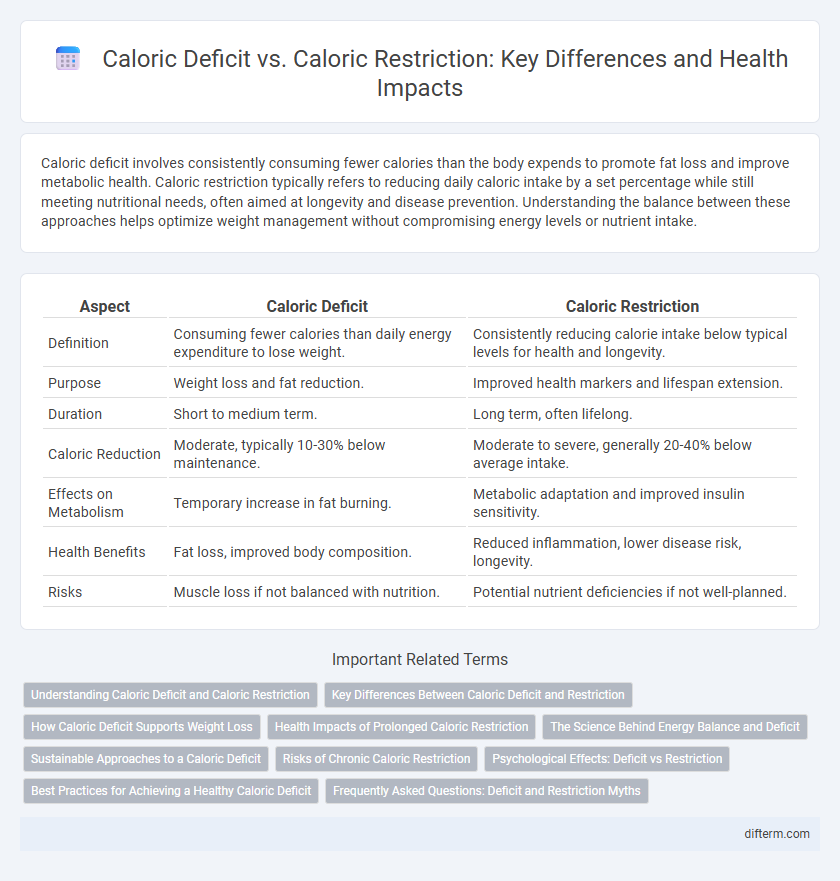Caloric deficit involves consistently consuming fewer calories than the body expends to promote fat loss and improve metabolic health. Caloric restriction typically refers to reducing daily caloric intake by a set percentage while still meeting nutritional needs, often aimed at longevity and disease prevention. Understanding the balance between these approaches helps optimize weight management without compromising energy levels or nutrient intake.
Table of Comparison
| Aspect | Caloric Deficit | Caloric Restriction |
|---|---|---|
| Definition | Consuming fewer calories than daily energy expenditure to lose weight. | Consistently reducing calorie intake below typical levels for health and longevity. |
| Purpose | Weight loss and fat reduction. | Improved health markers and lifespan extension. |
| Duration | Short to medium term. | Long term, often lifelong. |
| Caloric Reduction | Moderate, typically 10-30% below maintenance. | Moderate to severe, generally 20-40% below average intake. |
| Effects on Metabolism | Temporary increase in fat burning. | Metabolic adaptation and improved insulin sensitivity. |
| Health Benefits | Fat loss, improved body composition. | Reduced inflammation, lower disease risk, longevity. |
| Risks | Muscle loss if not balanced with nutrition. | Potential nutrient deficiencies if not well-planned. |
Understanding Caloric Deficit and Caloric Restriction
Caloric deficit occurs when the body burns more calories than consumed, leading to weight loss by utilizing stored fat for energy. Caloric restriction involves intentionally reducing daily calorie intake below maintenance levels without malnutrition, aiming for improved metabolic health and longevity. Both approaches impact energy balance but differ in application and long-term effects on body composition and metabolic function.
Key Differences Between Caloric Deficit and Restriction
Caloric deficit involves consuming fewer calories than the body expends daily, promoting gradual weight loss by creating an energy shortfall. Caloric restriction is a more controlled and often long-term reduction in calorie intake, typically by 20-40%, aimed at health benefits beyond weight loss such as improved metabolic efficiency and longevity. Unlike caloric deficit, which adjusts intake based on activity levels and weight goals, caloric restriction focuses on consistent, sustained calorie reduction without necessarily aiming for immediate weight change.
How Caloric Deficit Supports Weight Loss
Caloric deficit occurs when the body consumes fewer calories than it expends, prompting it to utilize stored fat for energy and resulting in weight loss. This metabolic state increases fat oxidation and improves insulin sensitivity, which are critical for effective and sustainable fat reduction. Maintaining a consistent caloric deficit balances energy intake and expenditure, ensuring gradual and healthy weight loss without compromising nutrient intake.
Health Impacts of Prolonged Caloric Restriction
Prolonged caloric restriction can lead to nutrient deficiencies, weakened immune function, and decreased bone density, increasing the risk of chronic health problems. Extended calorie deficits may also cause hormonal imbalances, impacting metabolic rate and reproductive health. Monitoring nutrient intake and ensuring balanced diets are essential to mitigate adverse health effects during long-term caloric restriction.
The Science Behind Energy Balance and Deficit
Caloric deficit occurs when energy expenditure exceeds calorie intake, prompting the body to utilize stored fat for fuel, which is fundamental for weight loss. Caloric restriction involves consistently reducing daily calorie consumption to create this deficit, influencing metabolic rate and hormonal responses that regulate hunger and energy use. Understanding the dynamic interplay between basal metabolic rate, physical activity, and caloric intake is crucial for effectively managing energy balance and achieving sustainable weight management.
Sustainable Approaches to a Caloric Deficit
Sustainable approaches to a caloric deficit emphasize gradual reductions in daily calorie intake combined with nutrient-dense foods to maintain energy levels and prevent muscle loss. Unlike strict caloric restriction, which can lead to metabolic slowdown and nutritional deficiencies, a moderate deficit supports long-term weight management and overall health. Incorporating regular physical activity enhances fat loss while preserving lean body mass, making the caloric deficit more effective and sustainable.
Risks of Chronic Caloric Restriction
Chronic caloric restriction can lead to significant health risks such as nutrient deficiencies, impaired immune function, and decreased bone density. Prolonged energy deficits disrupt hormonal balance, causing symptoms like fatigue, menstrual irregularities, and muscle loss. Studies highlight that maintaining adequate micronutrient intake and avoiding extreme caloric restriction are crucial for preventing long-term metabolic damage.
Psychological Effects: Deficit vs Restriction
Caloric deficit involves consuming fewer calories than expended, promoting gradual weight loss with minimal psychological stress by allowing flexible eating patterns. Caloric restriction, often more rigid and prolonged, can increase feelings of deprivation, heighten stress levels, and elevate the risk of disordered eating behaviors. Research shows that moderate deficits support sustainable habits and mental well-being, while severe restriction commonly correlates with anxiety and decreased motivation.
Best Practices for Achieving a Healthy Caloric Deficit
Maintaining a healthy caloric deficit requires a balanced approach that prioritizes nutrient-dense foods, regular physical activity, and sustainable portion control to avoid nutrient deficiencies and metabolic slowdown. Incorporating whole grains, lean proteins, healthy fats, and fiber-rich vegetables supports energy levels and muscle preservation during weight loss. Monitoring progress with tools like food diaries or apps and adjusting caloric intake based on individual metabolism ensures a safe and effective deficit for long-term health.
Frequently Asked Questions: Deficit and Restriction Myths
Caloric deficit occurs when the body consumes fewer calories than it burns, promoting fat loss without necessarily reducing nutrient intake, while caloric restriction involves consistently limiting calorie intake, often leading to overall lower energy consumption. Common myths confuse caloric deficit with starvation or muscle loss, but a well-managed deficit supports fat loss while preserving muscle mass and metabolic function. Scientific evidence debunks the notion that caloric restriction alone guarantees longevity or health, emphasizing balanced nutrition and sustainable intake over extreme calorie cuts.
Caloric Deficit vs Caloric Restriction Infographic

 difterm.com
difterm.com